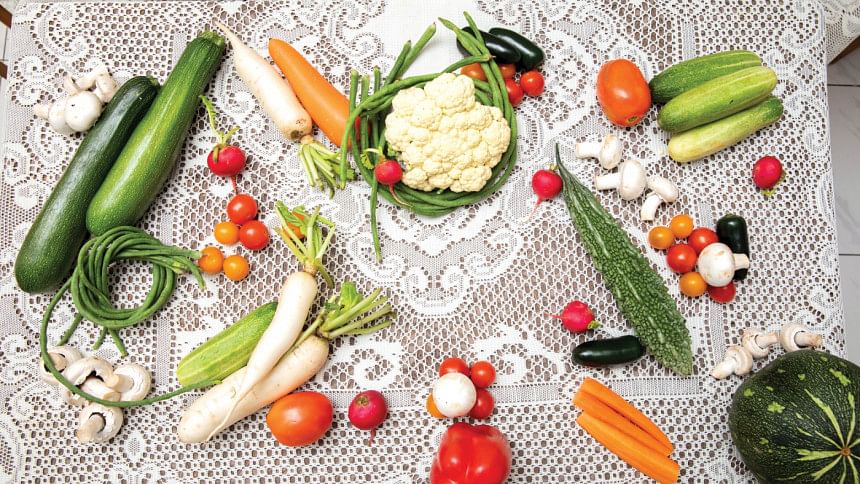Healthy diet for healthy bodies


Our bodies are important. They are the vessel through which we live and experience everything in this world, and so it is important we take care of them. And while exercise and good sleeping habits are important in keeping us healthy, in the end, it is diet and nutrition that play the largest role in maintaining and sustaining a healthy body.
Consuming a balanced diet throughout one's life helps to prevent malnutrition in all of its manifestations, as well as a variety of diseases, illnesses, and other health problems. However, increased processed food production, rising urbanisation, and changing lifestyles have resulted in a shift in dietary trends.
Individuals are eating more foods that are heavy in energy, fats, free sugars, and salt/sodium, and many people do not eat enough fruit, vegetables, and dietary fibres like whole grains.
Individual attributes (e.g., age, gender, lifestyle, and level of physical activity), cultural background, regionally accessible foods, dietary habits as well as conditions such as heart problems, diabetes, etc. will all influence the exact composition of a diverse, balanced, and nutritious diet. However, the fundamental concepts of what defines a healthy diet remain unchanged. For one, a nutritious diet should include fruits and vegetables, grains, nuts, protein, carbohydrates as well as fats, salt, sugar, etc. but the amount and quantity needed will vary for special dietary needs.
A vegetarian diet
Vegetarianism is increasingly becoming popular, and for good reason too! Not only is it good for your body but it is also good for the environment and the world to consume less meat. To get the most out of a vegetarian diet, eat a range of healthy plant-based foods, such as whole fruits and vegetables, legumes and nuts, and whole grains.
Simultaneously, limit your intake of less healthy options such as sugar, sweetened beverages, fruit juices, and refined carbohydrates. If you require assistance, a qualified dietitian or nutritionist can assist you in developing a vegetarian diet that is appropriate for you, especially because there are just so many types of vegetarian diets.
As vegetarianism is a restrictive diet, pay close attention to certain nutrients such as protein, calcium, etc. Protein is important in your diet as it helps maintain healthy skin, bones, muscles, and organs and you can add it to your diet more with plant-based protein sources such as soy products and meat substitutes, legumes, lentils, nuts, seeds, and whole grains.
Calcium is necessary to build and maintain strong teeth and bones and you can easily substitute milk for calcium-enriched and fortified products such as cereals, soy milk, soy yoghurt, and tofu as well as dark green vegetables, such as kale, and broccoli.

Diabetes or pre-diabetic diet
A diabetes diet simply entails consuming the healthiest foods that are naturally rich in nutrients while being low in fat and calories in moderation and adhering to regular mealtimes. Fruits, vegetables, and whole grains are essential when following a diabetic or pre-diabetic diet. It is of course recommended that you follow the diet developed for you by your doctors or dietician but here are some basic guidelines to get you started.
For one, you must choose healthy carbohydrates, fibre-rich foods, and "good" fats. Healthy carbohydrates may include vegetables, whole grains, and legumes, such as beans, lentils, and peas, and avoid less healthy carbohydrates, such as those with additional fats, sweets, or sodium.
Fibrous foods include fruits, vegetables, and whole grains. Foods high in monounsaturated and polyunsaturated fats can help decrease your cholesterol. Avocados, almonds, olive and peanut oils are all examples of 'healthy fats' however, it is advised to not overdo it as all fats are high in calories.
Gluten-free or low-carb diet
A gluten-free or low-carb diet is gradually becoming more essential to controlling the signs and symptoms of coeliac disease and other gluten-related medical problems such as non-celiac gluten sensitivity, wheat allergy, etc. Once again, it is advised that you seek out a doctor, dietician, or nutritionist first, however, this is a general how-to for anyone starting or desiring a gluten-free or low-carb diet.
In theory, a gluten-free diet seems easier to maintain than other diets — simply cut out gluten from your regular food plan and you are good to go! But in practice? It is a lot harder. For one, gluten is found in so many of our favourite foods such as most cakes, pies, pizza, bread, fries, and pastas as well as sauces such as soy sauce and mustard. That is a long list of foods you might have to say goodbye to forever!
However, all is not lost. Many fresh, natural foods, such as fruits and vegetables, beans, seeds, legumes, and nuts in their original, unprocessed forms, as well as eggs and most kinds of protein and dairy products, can be included in a gluten-free diet as well as certain grains such as quinoa, rice as well as gluten-free flours.
It is our primary duty to take care of our body, to nourish it properly, feed it, and love it. And it all starts and ends with healthy diets so we can have healthy bodies.
Photo: Sazzad Ibne Sayed
Styling: RBR

 For all latest news, follow The Daily Star's Google News channel.
For all latest news, follow The Daily Star's Google News channel. 



Comments